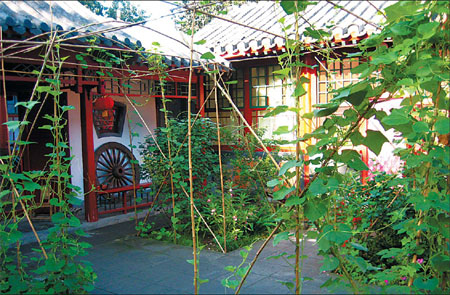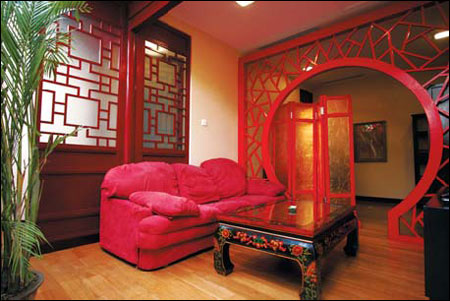|

|
|
A traditional siheyuan in Beijing is very popular among new expats. |
 |
|
Renters can add modern touches to these hutong homes. |
American Steven Hill swapped his university dorm for a Beijing siheyuan believing it's a better base for building relationships with the local community.
"It makes me feel like I'm living in China - not just in Beijing," the 22-year-old university instructor says.
His courtyard house is actually an apartment building near Nanluoguxiang, part of a re-development project, designed to combine the traditional aesthetics of a siheyuan with the space-efficiency of multi-story structures. "We were looking for a mix of Chinese apartments and Western amenities - something not too expensive but we'd have our own toilet," Hill says.
But the community feel of the project cinched the deal and seemed "more like home", he says.
"In typical high-rise apartments, you don't know anyone, aside from maybe someone across the hall."
Hill pays 5,000 yuan ($730) per month for his 90-sq-m apartment. For more modern apartments, monthly rent starts from about 1,500 yuan for a 40-sq-m unit to 8,000 yuan for a 120-sq-m home.
Briton Mark Henderson says the location of the apartment he and his fiance share on Dongzhimenwai Dajie's Season's Park is both a boon and bane.
"It's close to public transport for all the best things in Beijing with lots of nice local restaurants, and good access to local shops and markets," the 29-year-old university instructor says.
"On the negative side, it's clear this neighborhood is somewhat removed from the normal lives of many Beijingers - not to say the rest of China. But as an introduction to the city, it's great."
And it's still less isolated than many places, he says.
"We both feel such gated communities are simply not necessary in a safe city like Beijing."
He recalls that security guards once refused to let his Chinese instructor into the compound.
"That made me feel very uncomfortable, because this is his city (but) I, as a foreigner, had to vouch for him."
Henderson believes the couple's experiences finding and renting an apartment were similar to those in the UK because they used an agency.
"That said, paying bills is very irritating. Phone, electricity and gas are paid in person at different banks, which is time-consuming and overly complicated," he says.
Hill says he didn't know utilities are usually prepaid in China.
"I was in the shower one day and the electricity went out, so I had to find my way out of the bathroom in the dark," he recalls, laughing.
One challenge for many foreigners is that most landlords in China require several months' rent in advance and lengthy leases - usually a year or two.
American Evan Hall says the rapid rate of expatriate turnover makes long-term contracts tricky.
"Foreigners, especially students, tend to arrive quickly and leave just as quickly," the 26-year-old English teacher, who lives in Wudaokou with two foreign roommates, says.
"There's little point in signing a six-month rental agreement for a four-month school semester."
Russian Tovbaz Yulia says she and her boyfriend got stuck in a bad lease when she first came to China a year ago.
"We were really in a hurry and didn't know practically anything about renting in Beijing," the 23-year-old manager of an international firm says.
The couple encountered resistance when they tried to move three months later, she says.
"They told us we needed to pay a lot and move immediately - that day. Of course, it was impossible."
After much negotiation and hassle, they switched to a better place on Dongsishitiao, she says.
Mexican Jos Gabriel Rodrguez, who came to Beijing just before the Olympics, says rental costs in China differ from his homeland.
"There were enough apartments to look at, but all of them were really expensive," the 23-year-old says.
"I hate negotiating and would like to not go through the whole 'how-much?' process."
He moved from living with two Swiss in Wudaokou to boarding with Chinese in Taiyanggong.
"I thought it was going to be really interesting because of the cultural exchange, but they stay locked in their rooms playing computer games all day, so we don't see each other that often."
But his neighbors are friendly and helpful, he says.
Hill says he is surprised by the pace at which Beijing's property market moves.
"If you see (a place) and you like it, you have to commit right away," he says.
"(My roommate) found it, and a week later we signed the lease. If you're looking a few months ahead, especially for a hutong, they're gone very quickly."
They have had little chance to engage their neighbors - mostly older Chinese - since moving in on Feb 1. But Hill says they plan to start knocking on doors to introduce themselves.
"That's something I'm looking forward to doing over the next few weeks."
(China Daily March 23, 2009)